


The death toll of the quake that struck Gansu and Qinghai provinces has risen to 149, with nearly 1,000 injured.
After the earthquake, more than 3,000 rescuers of various types have arrived at the quake-hit areas.
A Y-20 strategic transport plane of the People's Liberation Army has transported 14 tons of rescue supplies, vehicles and rescuers to the earthquake-hit area.
The Ministry of Emergency Management and the Ministry of Finance have allocated 200 million yuan ($28 million) to support quake relief efforts in the two provinces.

As of 3 pm on Tuesday, the rescue work for the earthquake in Gansu province has begun to reach its end. The work focus will shift to the treatment of the wounded and the resettlement of the affected people to ensure the safety of people's lives and property, according to a news conference held on Wednesday.
The 6.2-magnitude earthquake that jolted Jishishan county at 11:59 pm Monday has resulted in 113 deaths in Gansu and 782 injuries as of 9 am on Wednesday.
A total of 14,939 houses collapsed and 207,204 houses were damaged in the earthquake, affecting 145,736 people of 37,162 households.
Currently, transportation, electricity and communication services have been fully restored, according to the news conference.
No secondary disasters have been reported, according to the quake relief headquarters. Operations in mines in the affected area have been urgently halted and people evacuated. However, reservoirs, hydropower stations, important river embankments and dam projects are operating normally.
There have been no reports of earthquake-related environmental pollution.
An inspection conducted at the Liujiaxia Hydropower Station shows that the dam body and other facilities, including the spillway structures, are working normally, according to the news conference.

The bonfire set ablaze at a temporary settlement in Jishishan county has provided much-needed warmth and hope for villagers dislocated by the earthquake that jolted a mountainous region in Northwest China's Gansu province near midnight of Monday.
"I was about to tuck in when a sudden tremor struck and our house collapsed within 10 seconds," said Ma Nuer, a villager in Kexinmin, near the epicenter of the quake. "My husband and I scrambled to jump out of the window to escape, so did our two sons."
"We spent the night shivering in below freezing temperatures in front our damaged home until the rescue team came, put up tents and distributed instant noodles and baked buns to us," said the 32-year-old.
"There is still much to worry about — like how to rebuild our houses and what happened to our possessions. But at least tonight, my family and I have the fire to warm us up and a shelter," she said.
Ma is among hundreds of residents in Kexinmin village — with a population of about 1,400— that had been resettled to three temporary accommodations by Tuesday evening.
The village is one of the most hard-hit during the quake that struck at 11:59 pm on Monday and killed more than 120 people and injured hundreds more in Gansu province and the neighboring province of Qinghai.
"The whole village looked flattened to us. My grandfather-in-law in his late 90s said that he had never experienced or even heard of such a tremor in his life," she said. Her grandfather is the only one who was injured during the quake and had been transferred overnight to a hospital at the county seat.
The Gansu Branch of Red Cross Society of China has rushed to set up 42 tents at two open grounds to shelter the displaced from temperatures that can plunge to below 16 degrees Celsius during the night. Another temporary settlement at the village is managed by emergency management authorities.
Wang Xihong, a member of an emergency rescue team administered by Gansu's Red Cross, said that he arrived in the village around 3 am on Tuesday and has been working nonstop to search for trapped residents, remove debris on roads and set up shelters.
"The most urgent demand at present is keeping affected residents warm amid these freezing temperatures," he said.
Wang said that local residents first started a small fire by themselves, and rescue personnel helped them build a larger bonfire where more people could gather around and warm themselves up.
"However, we still need more cotton quilts and jackets to weather the piercing chill at night," he said.
Wang said that the tents are designed to last at least three months. "More equipment and materials are being transported here to build outdoor toilets and infrastructure to ensure clean water."
Ma Lina, mother of a one-year-old baby, said she considers herself lucky as her house basically held up despite the strong shake, making it possible for her to retrieve some diapers and milk powder for her son before running outside.
But her house, like nearly all buildings in the village, is severely damaged and not safe to live in.
Her husband wrapped their baby under layers of blankets and jackets and held him tightly to his chest.
"The baby knew nothing and appeared to be calmer than us adults as long as we hugged him," she said. "But we were a little concerned because he had not fully recovered from a cold and his condition might get worse under this weather."
In the early hours on Wednesday, a truck loaded with 1,440 quilts and 150 folding beds arrived in the village.
"I would probably be able to snooze a bit by noon of Wednesday," said Wang, the rescue personnel. "But taking a break is not on our mind right on, we just want to help as many villagers as possible."

Local education authorities are urged to actively respond to the recent freezing weather and the magnitude 6.2 earthquake in Jishishan county, Linxia, Gansu province as an effort to ensure the organization of the postgraduate studies entrance exam in China this weekend.
Education departments and examination institutions in affected regions should keep close contact with meteorological and seismological counterparts to enhance extreme weather forecasting and earthquake warnings, the Ministry of Education said on Wednesday.
They should improve emergency plans and prevention measures to minimize adverse impacts on the organization of the examination, it said. The investigation of hidden risks at examination centers and venues should be conducted, ensuring the normal operation of infrastructure and preventing disruptions caused by extreme weather and secondary hazards after earthquakes.
Convenient services are in place to aid candidates on their way to the examination center, it added.
As of Wednesday morning, nearly 130,000 relief items, including tents, stoves, coats, quilts and folding beds, had been sent to the earthquake zone in Gansu province, aimed to ensure the basic necessities for the victims of a magnitude-6.2-earthquake that occurred late on Monday.
The quake mainly hit Jishishan county, Linxia Hui autonomous prefecture in Gansu.
Four seriously affected towns, including Dahejia township in the county, have all received disaster relief supplies, according to the Gansu provincial emergency management department, which released the information during a news conference on Wednesday morning.
So far, 87,076 people from 20,457 households have been relocated to temporary sites, it said.
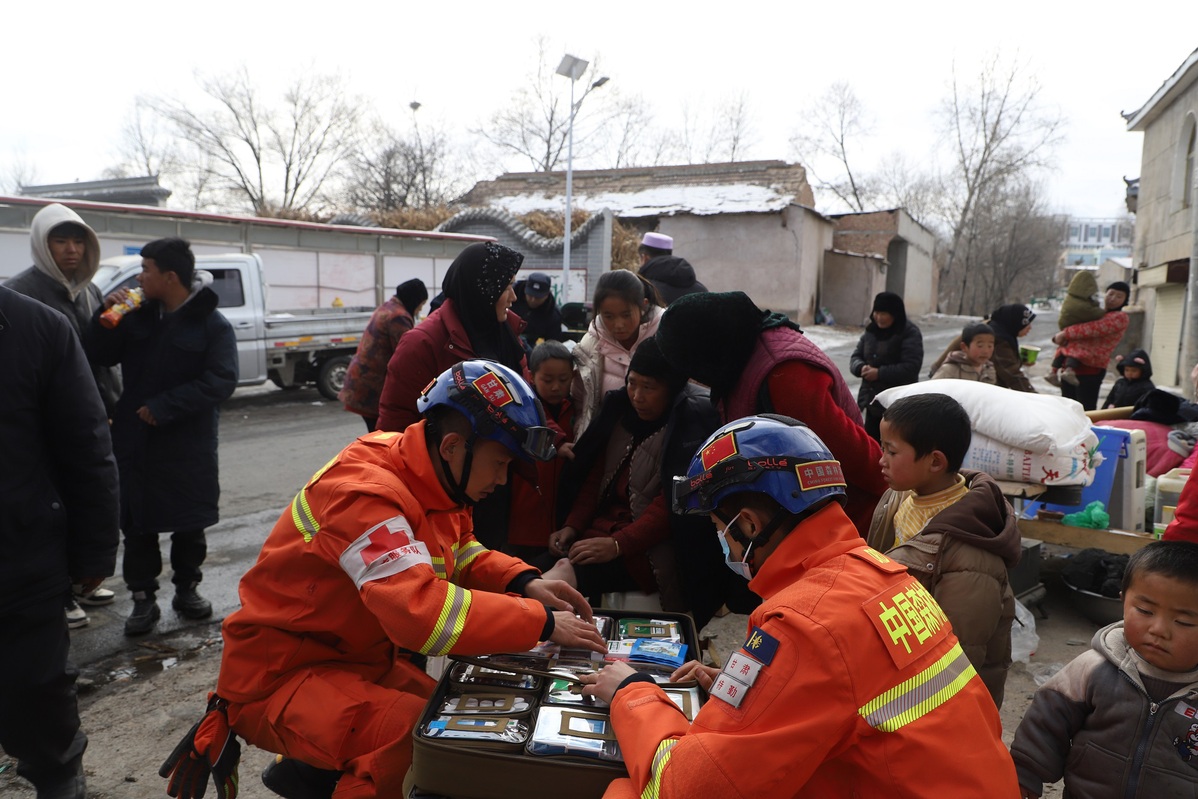
In addition, the province has urgently deployed food, including steamed buns and instant noodles, as well as heating facilities, to ensure that people in the affected areas have enough to eat and a warm living environment.
In the next step, the province will build simple transitional dwelling. Each household will have at least a cotton-padded tent and a transitional house for the winter.
Other basic supplies, including water and electricity, will be guaranteed at the relocation sites.
To ensure smooth traffic for transporting the supplies and doing other rescue work, the transportation department of Gansu is hurrying to repair highways and expressways that were damaged in the quake.

As of 11 am on Tuesday, all expressways and highways leading to disaster areas, as well as all 24 severely damaged rural roads, had been cleared, according to the department.
Because of the impact of the earthquake — and aftershocks that may occur later — risks for some road sections continue, a spokesman of the department said at the conference, adding that vehicles should drive slowly.
Green channels have been set up at toll stations leading to affected areas, providing free passage for rescue vehicles, as well as free catering and other services. The free time will be available until Jan 18.
Planning for post-disaster reconstruction work has begun, as the department organized experts to assess the damage to roads and make all-around preparations for a post-disaster recovery.
Doctors at the People's Hospital of Linxia are racing against time to save lives after a deadly earthquake hit Jishishan county in Northwest China's Gansu province around midnight on Monday.
Yang Huyong, deputy director of the intensive care medicine department at the hospital, said during an interview on Tuesday afternoon that they were treating over 100 patients transferred from stricken communities, aged from 2 to 79.
Nine surgeries have been performed so far and there are more than 30 cases classified as severe or critical, Yang said, adding that common injuries included cranial trauma and fractures.
The hospital has over 100 ICU beds, he added.
The 7-year-old Ma Yating was woken up by the shake of her home in Jishishan county. When trying to get out of bed, she was hit by a stone slab on her back.
"She was transferred to the hospital around 1:30 am on Tuesday through the help of our village officials," said Ma's grandmother.
According to doctors at hospital, Ma was diagnosed with a mild bone fracture but there is no need to carry out surgeries at present.
"Both her parents are away and picking up gig jobs in other regions. She was terrified but is now able to have some porridge, which is a great relief to me," said the grandmother.
Doctors at the hospital said that Ma is under close observation and will receive psychological services in the coming days to help ease her anxiety.
Zhang Lei, an intensive care specialist from Gansu Province Central Hospital in Lanzhou, provincial capital of Gansu, was dispatched to the hospital to help treat the injured.
"The top priority at present is screening all patients and identifying those at risk of developing into severe cases and put them into intensive care units as early as possible," he said.
According to the hospital, there are six medical aid teams comprising over 40 personnel offering support at the People's Hospital of Linxia and nurses have been mobilized from other hospitals.

In response to a 6.2 magnitude earthquake that struck Jishishan county in Gansu province, the Ministry of Natural Resources has organized a team of experts from the China Geological Survey to rush to the affected area.
As of 7 pm on Tuesday, the CGS has dispatched four working groups comprised of 33 people. Equipped with unmanned aerial vehicles, 3D laser scanners and other specialized equipment, these teams have been deployed to the disaster areas in Gansu and Qinghai provinces. The initial group of six experts has already arrived at the epicenter region of Jishishan.
The groups will work with emergency management departments and local governments to conduct on-site geological hazard investigations, drone surveys, monitoring and early warning operations, risk assessments, and emergency response efforts.
The CGS has coordinated with its affiliated units to provide geological hazard reports and maps of the affected areas. They have also arranged for satellite passes to capture images and initiated seismic analysis and research on the earthquake mechanism. Some report materials have been submitted for disaster relief purposes.
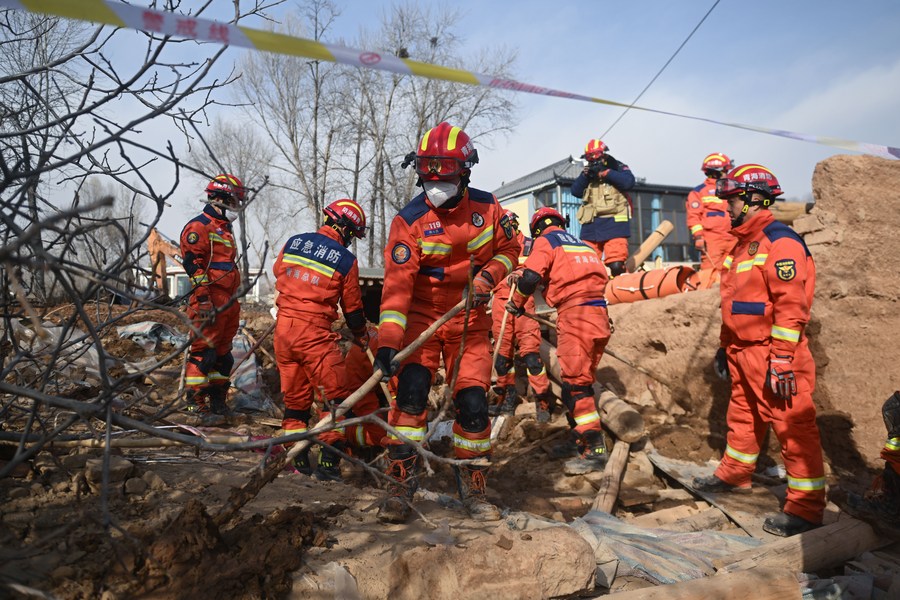
XINING -- The 6.2-magnitude earthquake that jolted Northwest China at midnight Monday has killed 18 people in Qinghai province, local authorities said on Wednesday morning.
As of 5:30 am, the disaster has injured 198 people in Qinghai, with 16 others still missing.
According to the China Earthquake Networks Center, the quake jolted at 11:59 p.m. Monday and has a focal depth of 10 km. The epicenter Liugou township is about 8 km from the county seat of the Bonan-Dongxiang-Salar autonomous county of Jishishan in Gansu province.
By Tuesday afternoon, a total of 113 people were confirmed dead in Gansu.
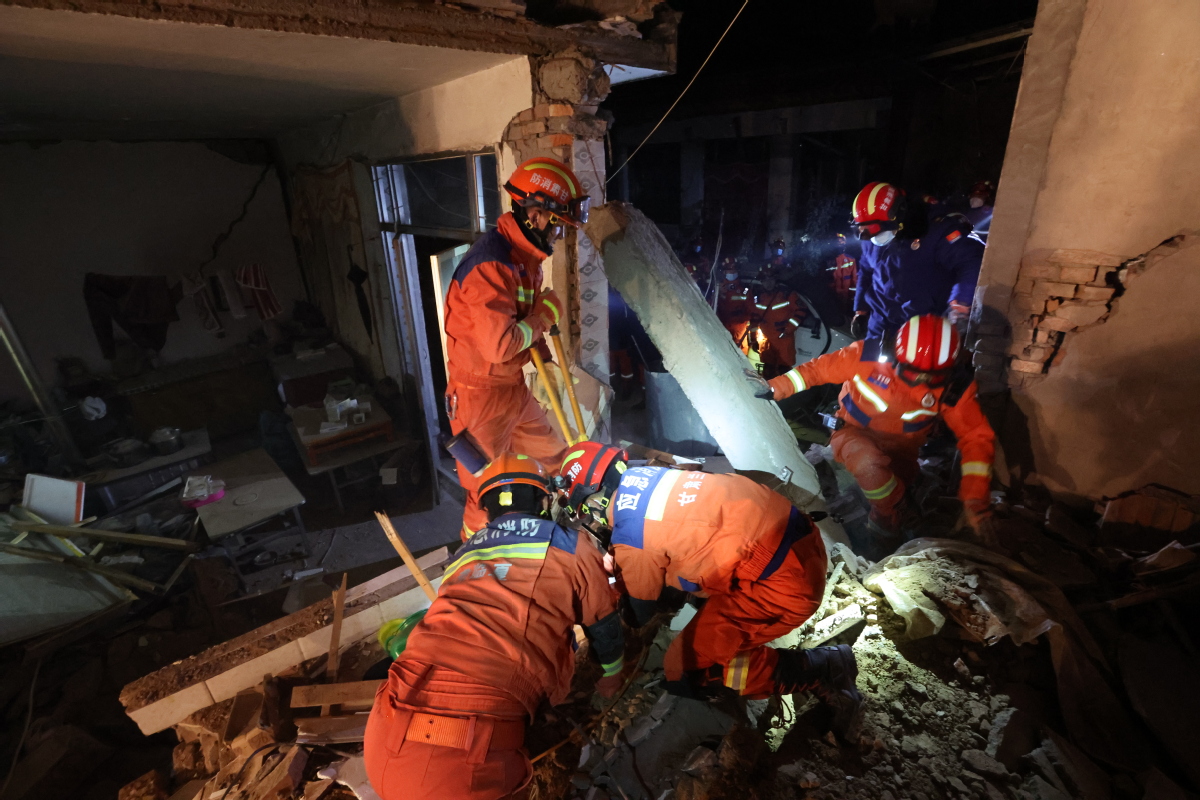
President calls for all-out response efforts in instruction shortly after disaster hits provinces
China's emergency response system swung into action on Tuesday to send rescue workers and provide aid in the wake of the magnitude 6.2 earthquake that struck northwestern China late Monday, killing at least 100 people and injuring more than 700.
The national mobilization took place swiftly after an instruction was issued in the early hours of the morning by President Xi Jinping, calling for all-out search and rescue efforts, proper arrangements for those affected and further efforts to prevent secondary disasters.
The earthquake — the nation's deadliest in nine years — struck just before midnight on Monday at a relatively shallow depth of 10 kilometers in Jishishan county in Linxia, Gansu province, about 5 kilometers from the boundary with Qinghai province, the China Earthquake Networks Center said.
The quake severely damaged houses and roads, and knocked out power and communication lines, according to provincial officials. As of press time on Tuesday, the death toll in Gansu was 113. Thirteen others were confirmed dead in Qinghai, in an area north of the epicenter.
Xi, who is also general secretary of the Communist Party of China Central Committee and chairman of the Central Military Commission, has instructed local authorities to rescue and treat those injured in a timely manner to minimize casualties, and closely monitor the situation and weather changes in the high-altitude affected areas to prevent secondary disasters.
He has also urged allocation of relief supplies to the quake-stricken areas as soon as possible, repair of damaged infrastructure such as electricity, communication, transportation and heating facilities, and proper accommodation of the affected people to ensure their basic living needs.
As instructed by Xi, the State Council, China's Cabinet, has sent a working group to the quake-stricken region to help guide disaster relief work.
The People's Liberation Army and the People's Armed Police Force have been instructed to collaborate with local authorities to carry out emergency rescue and disaster relief work, and do their utmost to ensure the safety of people's lives and property.
Premier Li Qiang has also issued instructions on quake relief work. He has urged quick assessment of the damage, proper evacuation and rehabilitation of the affected people, and timely release of information.
As part of the orderly relief management, emergency supplies such as tents and folding beds have been sent to the affected areas in Gansu and Qinghai.
The Ministry of Emergency Management and the Ministry of Finance have allocated 200 million yuan ($28 million) to support quake relief efforts in the two provinces.
While 150 million yuan will be used to support relief work in Gansu, 50 million yuan will aid relief efforts in Qinghai, the ministries said in a statement.

A magnitude 6.2 earthquake that hit Gansu and Qinghai provinces on Monday night resulted in a large number of casualties because the areas near the epicenter are densely populated and the seismic intensity of the quake was high, experts said.
The earthquake occurred shortly before midnight, with its epicenter in Gansu's Jishishan county, causing maximum damage there and in the city of Haidong in neighboring Qinghai. As of press time, 113 people had died in Gansu, and Qinghai reported 13 deaths.
The quake had a focal depth of 10 kilometers. The average altitude of the areas within a range of 5 km from the epicenter stands at 2,793 meters, according to the Ministry of Emergency Management. The low night temperature in the area around this time of the year would also make survival difficult for those trapped in the rubble.
Chen Yiran, chief engineer at the Sichuan Zhongke Institute of Disaster Prevention and Mitigation, said that based on information he had, there are 10 villages located within 5 km of the epicenter and 10 towns within 20 km.
"The population in the areas close to the epicenter is quite dense," he said.
The seismic intensity of the earthquake near the epicenter is currently estimated to be degree 8, with degree 12 representing the strongest. While buildings in some metropolises such as Beijing are designed and built to resist such high intensity earthquakes, many houses in the affected areas of Gansu and Qinghai were not designed to handle such a strong quake, Chen said.
"The focal depth of the earthquake is shallow. This is also a factor responsible for the extensive damage," he said.
He said the jolt occurred when many people in the affected areas were sleeping. This also contributed to the high casualty figure.
According to the China Earthquake Networks Center, Monday's jolt was a thrust fault earthquake. These usually occur when two slabs of rocks press against each other, but the pressure overcomes the friction holding them in place.
In an interview with China News Service, Gao Mengtan, an expert at the China Earthquake Administration's Institute of Geophysics, said that Monday's earthquake, though not of a very high magnitude, resulted in very intense shocks on the ground and could cause severe mountain collapse and landslides later, which is in line with the characteristics of a thrust fault earthquake.
The China Earthquake Networks Center said that since 1900, three earthquakes above magnitude 6 have occurred within a range of 200 km from the epicenter in Jishishan.
Nine aftershocks of magnitude 3 and above were registered in the first four hours after the Monday earthquake, including two of above magnitude 4, the networks center said.
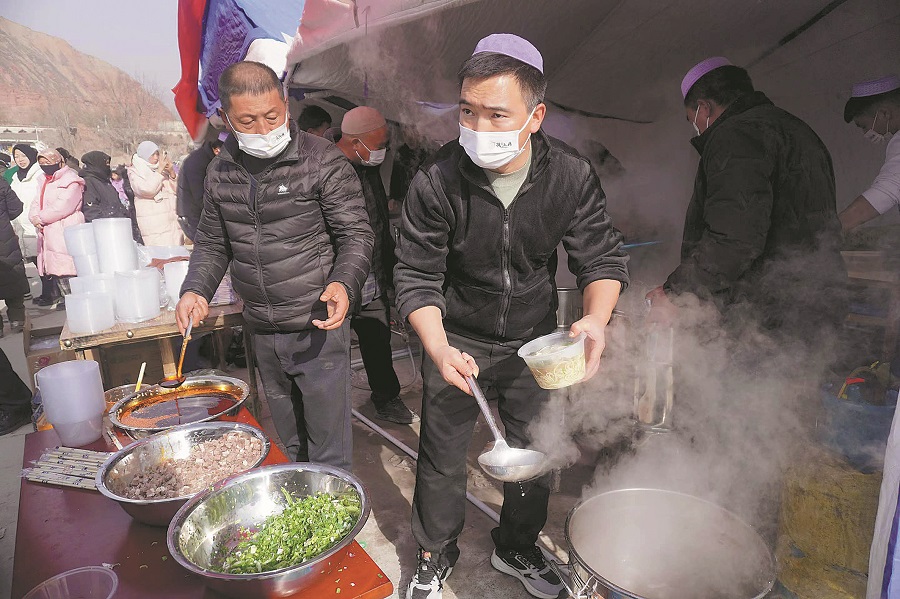
Efforts: Six medical teams at hospital treating injured
A bowl of piping hot beef noodles and a cup of drinking water at a relief camp on Tuesday offered Ma Mengke the warmth and comfort he desperately needed after a magnitude 6.2 earthquake jolted him and his family members out of sleep around midnight on Monday in Northwest China's Gansu province, and left them without a home overnight.
"My family is safe here. We have blankets and stoves to stay warm and boil water. The members of the rescue team care for our needs," said Ma, 27, at the relocation site in Jishishan county, the epicenter of the quake in Gansu's Linxia Hui autonomous prefecture.
The makeshift camp, located at the town square, has 102 tents, each of which can accommodate eight to nine people. Ma and 1,000 other residents of the county, whose houses were damaged or destroyed in the quake, spent the night in the tents.
They received meal boxes provided by local authorities and beef noodles cooked by volunteers from a private company.
Ma Qinglong, chairman of Xingda Group, the private company, said, "We prepared 500 kilograms of beef today (Tuesday) to help everyone get through the difficult time."
Meanwhile, rescue teams braved the winter chill to continue their search for survivors. The substantial difference between day and night temperatures in Jishishan made the search and rescue operation more challenging.
Wang Duo, a team leader from the Gansu Houtian Disaster Rescue Center, said the minimum temperature is around -10 C, and those trapped under the rubble of collapsed buildings are at great risk.
Liu Xuefeng, deputy head of Gansu's Forest Firefighting Department, said his 200-member team was among the first responders. The team arrived in Jishishan county as early as 2 am on Tuesday.
Liu said that residents grabbed whatever warm clothes or heating equipment they could and ran out of their homes when the quake hit. Many houses were badly damaged, he added.
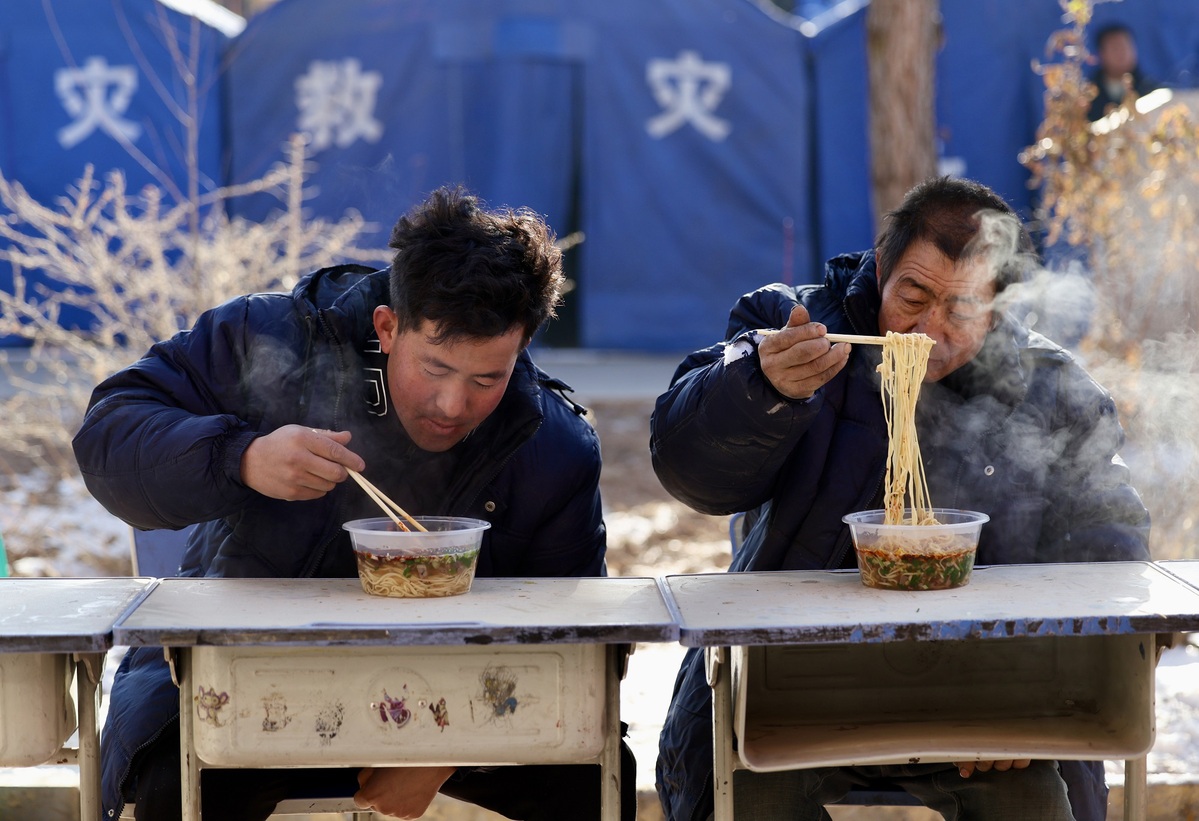
At the local hospitals, doctors also raced against time to save lives.
Yang Huyong, deputy director of the intensive care medicine department at the People's Hospital of Linxia, said they were treating over 100 patients, aged 2 years to 79 years, as of 5 pm on Tuesday. The hospital has over 100 ICU beds.
Nine surgeries have been performed, and there are more than 30 cases classified as severe or critical, Yang said, adding that the serious injuries included cranial trauma and fractures.
Currently, there are six medical teams comprising over 40 personnel providing support at the People's Hospital of Linxia, while nurses have been mobilized from other hospitals.
In addition to government efforts, people helped one another survive the ordeal.
At the Gaji Chunlei Primary School in Liugou township, 79 boarding students were escorted to the playground by their teachers as soon as the earthquake hit the area.
Zhang Shunshan, the school's vice-president, said the teachers lit charcoal fires and used quilts to keep the children warm through the small hours. "We later contacted the parents and helped the students get back home safely by 10 am," Zhang said.
Gansu's earthquake relief headquarters has started a level-two quake emergency response, local authorities said.
Wang Xiaoyu in Jishishan county, Gansu contributed to this story.

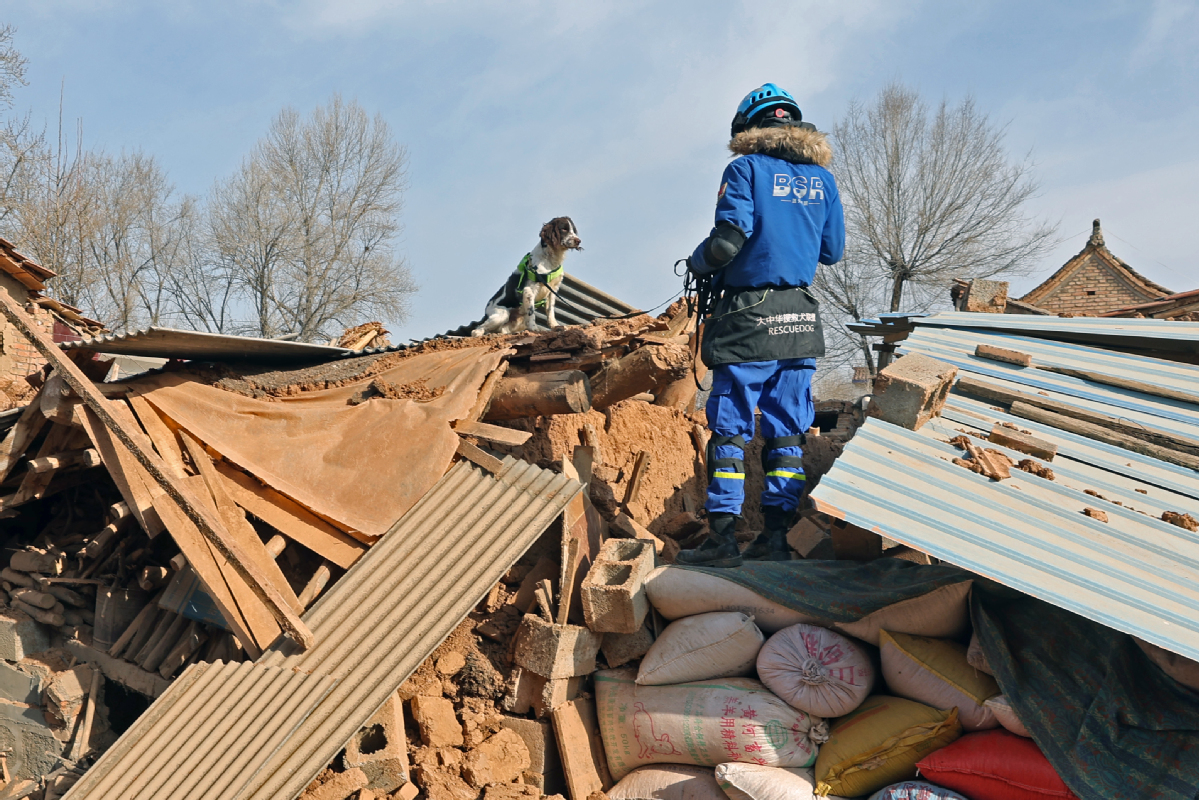
Various disaster relief efforts have been made to aid the Jishishan county in Linxia Hui autonomous prefecture, Northwest China's Gansu province jolted by a 6.2-magnitude earthquake late Monday evening, causing death, destruction and panic.





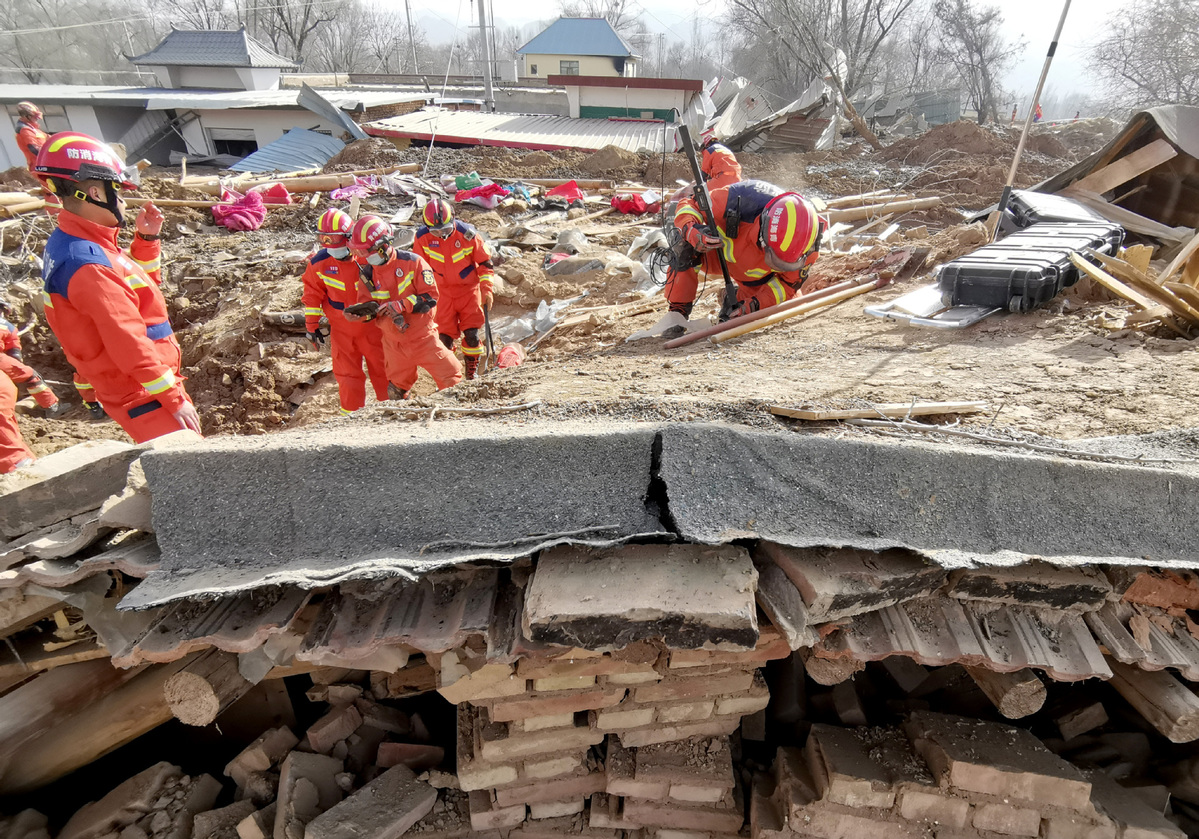
More than 3,000 rescuers of various types have arrived at the quake-hit areas after a devastating earthquake hit Gansu and Qinghai provinces late on Monday, according to the Ministry of Emergency Management.
It said 2,042 of the rescuers are from the National Comprehensive Fire and Rescue Team, who brought with them 381 vehicles and 37 rescue dogs. In total, they have saved 74 people trapped from the quake and evacuated almost 4,300 residents.
The release said 294 members from 11 civilian rescue teams have also arrived, with another 500 of their colleagues well prepared to join them after receiving orders.
The rescue forces were also reinforced by 736 people from 28 rescue teams dispatched by some centrally administered State-owned enterprises, it said. Another 2,800 rescuers with such SOEs have been ready to offer help.
Rescue teams rush to save people trapped in extremely cold weather by a magnitude-6.2 earthquake that jolted Jishishan county in Northwest China's Gansu province late Monday evening.
Pakistani Prime Minister Anwaar ul Haq Kakar has extended a message of sympathy to the Chinese people over the 6.2-magnitude earthquake that has caused over 100 deaths in Gansu and Qinghai provinces at midnight Monday.
Kakar wrote in the social media platform X on Tuesday that he is "deeply saddened to learn about the loss of precious lives due to the earthquake in Gansu province in China."
"Our sympathies are with our Chinese brothers and sisters in this hour of grief," he added.
Jalil Abbas Jilani, foreign minister of Pakistan, has also extended heartfelt condolences on the social media platform X.
After the deadly earthquake jolted Gansu province in northwestern China, many enterprises have taken prompt actions to shoulder their corporate social responsibilities, donating funds and urgently needed goods to support the rescue and relief work in the affected regions.
After a magnitude of 6.2, the earthquake has caused 105 deaths in Gansu province and 13 deaths in Qinghai province as of Tuesday noon, according to China Central Television.
Beijing-based tech company ByteDance donated 20 million yuan ($2.8 million), and through the One Foundation, shipped the first batch of 1,000 quilts to the quake-hit areas.
ByteDance activated an emergency response mechanism and launched nonprofit projects on its public platform to raise money for the affected population and develop a disaster search function in collaboration with media and rescue teams.
Through the China Women's Development Foundation, China's sportswear company Li-Ning committed to donating cold protection supplies valued at 20 million yuan. The first batch of 10,000 down jackets are scheduled to head to the disaster-stricken people and rescue personnel in Gansu's Jishishan county, the epicenter, and the remaining supplies will be gradually allocated to other affected areas.
China's internet-based platform company Tencent donated 20 million yuan. Motor company BYD and smartphone brands Vivo and Oppo each donated 10 million yuan respectively.
After transporting more than 50,000 boxes of relief materials which included instant noodles, water, bread and chicken sausages, global technology and e-commerce company Alibaba announced an additional donation of 10 million yuan.
Tim Cook, CEO of the United States-based tech giant Apple, expressed his sorrow on his personal Weibo account and said that the company will be donating to support the relief and rebuilding efforts.
Local authorities have announced two official donation channels through the Jishishan county Red Cross and the county-level charity association. Funds, relief materials and rescue teams are needed.
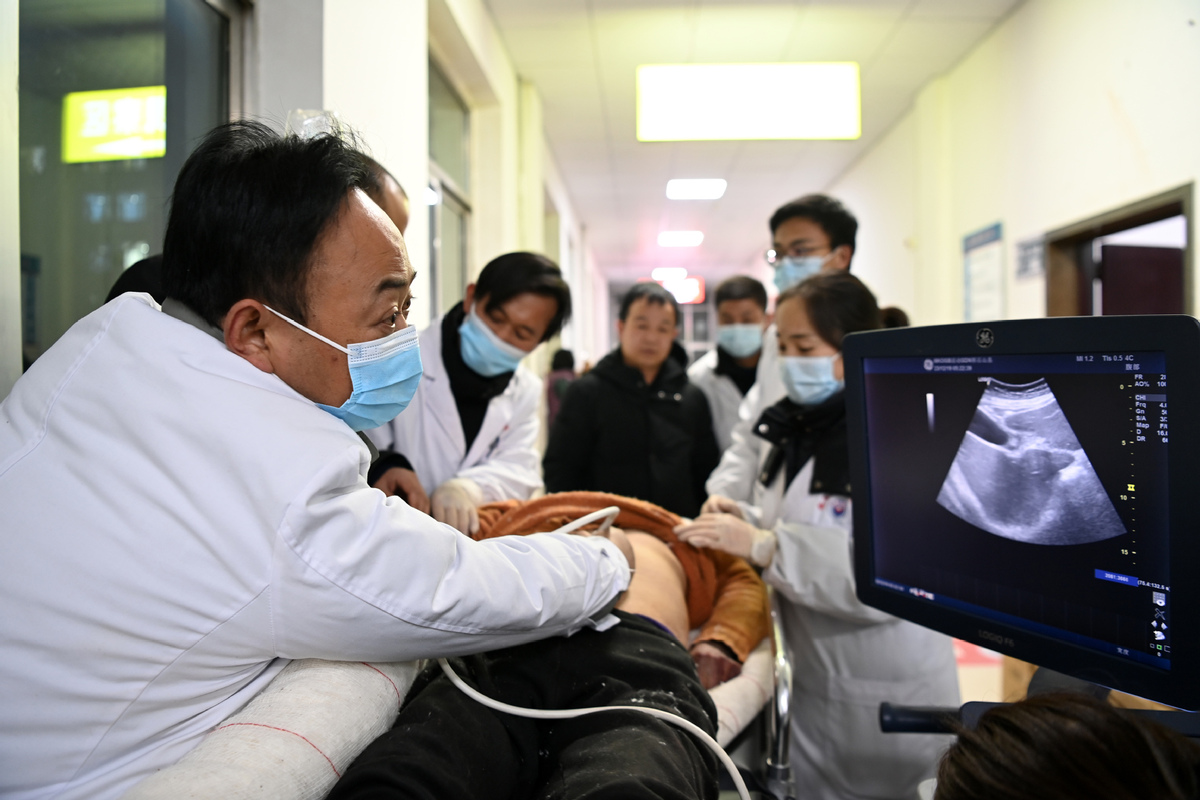
LANZHOU -- In the grip of a cold wave, with temperatures plummeting below minus 10 degrees Celsius, the plateau county of Jishishan in Northwest China's Gansu province was jolted from its slumber midnight Monday by a 6.2-magnitude earthquake, causing death, destruction and panic.
Xinhua reporters arrived at the severely-affected Chenjia village in Dahejia township at around 3 am Tuesday, finding it plunged into darkness as a blackout gripped the area, and electricity cables dangled on the ground. Several houses crumbled, leaving streets strewn with shards of glass, bricks and rocks.
According to local villager Ding Xiaolong, he was asleep at home when the quake struck. The intense tremor woke him and he quickly rushed out of the house for safety.
Speaking to Xinhua, Ding said he feels fortunate for being able to escape, but he also conveyed deep sadness for one of his fellow villagers who is currently working in the coastal city of Xiamen, located more than 2,000 kilometers away.
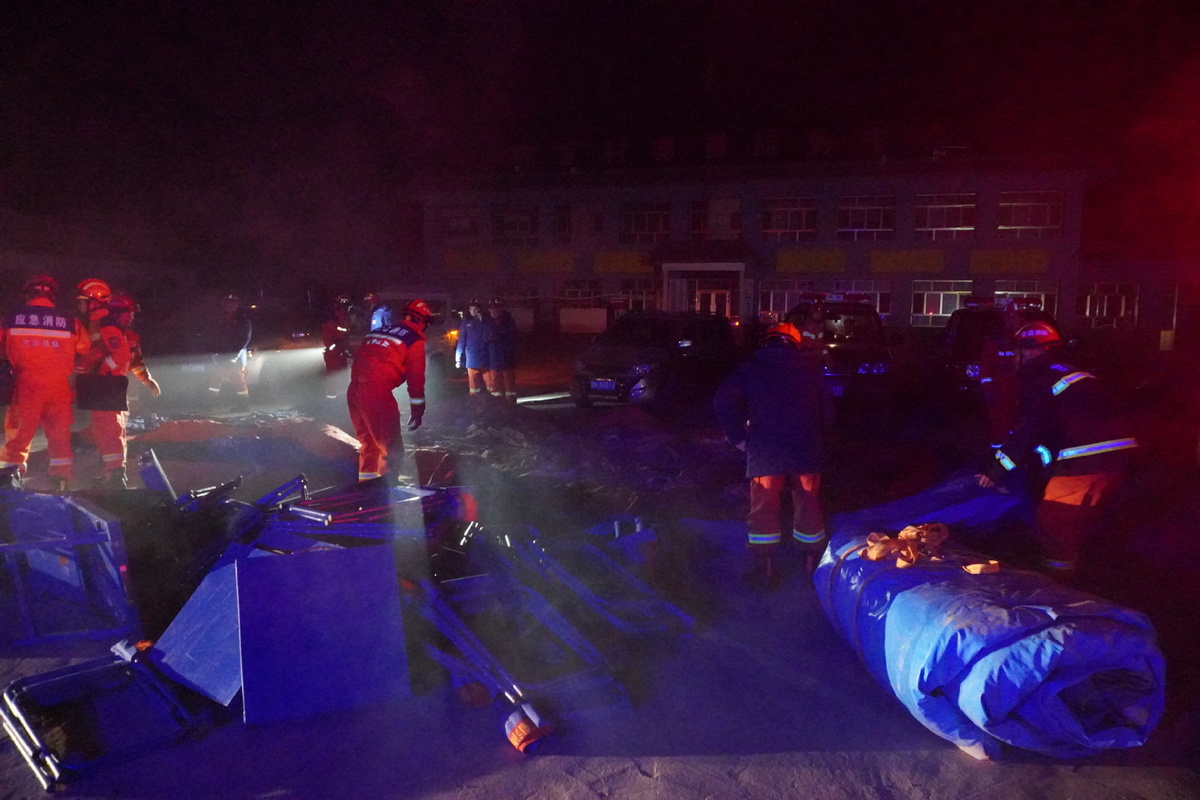
"I received a phone call from him after the quake, and he asked me to check on the situation of his family," Ding said, adding that he rushed to their house, only to discover it had been leveled to the ground, with four people buried underneath.
Despite Ding's efforts to gather over 20 people for help, it proved futile as it was already too late. All four members of his friend's family had lost their lives.
Ma Shijun, a student at Dahejia Middle School, recounted running out of the dormitory barefoot, without even grabbing a coat, which left his hands slightly numb. Following the earthquake, teachers promptly organized students to seek refuge on the playground.
"Seeing more and more rescue personnel arriving, I find myself less frightened than I was when the earthquake first struck," Ma said.
According to the China Earthquake Networks Center, the quake jolted at 11:59 pm Monday and has a focal depth of 10 km. The epicenter is about 8 km from the county seat of Jishishan Bao'an, Dongxiang, Salar autonomous county.
As of 10 am Tuesday, a total of 105 were confirmed dead in Gansu and 11 in the neighboring Qinghai province, with hundreds injured.
Due to high altitude, cold weather and complex geological conditions, Jishishan county is prone to natural disasters, such as earthquakes. Since 1900, the area within a radius of 100 km from the epicenter has recorded seven earthquakes above 5 magnitude.
Villagers are being evacuated to secure locations, medical teams are racing against time to help those in need, and taxi drivers are transporting the injured to hospitals. Rescue vehicles and ambulances are rendering vital assistance in the earthquake-affected areas.
Members of the Gansu branch of the Blue Sky Rescue Team, a Chinese civil relief squad, have set up dozens of tents in the public square of Dahe village. Local officials have provided warm water for the affected residents to consume and use for preparing instant noodles.
Around 2 am Tuesday, taxi driver Madahud headed towards the Chenjia village. He said that his phone had been inundated with messages seeking help.
In Dahejia township, where the temperature plummeted to 16 degrees Celsius below zero, over 140 medical staff at a local hospital were busy treating the injured people. According to first-person accounts, the loved ones of many of these patients are untraceable in the aftermath of the earthquake.
"All seven of our houses collapsed," said Shi Lizhen, who works with the hospital of integrated traditional Chinese and Western medicine in Jishishan county. Wiping away tears, she placed several bottles of saline solution in the quilt to prevent freezing.
Ma Yuanjun, head of the hospital, told Xinhua that cracks were found on the hospital building walls, prompting the hospital staff to get the medical supplies out of the warehouse and set up makeshift beds by the road to treat the injured.
"Life is paramount," he said. "There is hope so long as people are alive."
All-China Federation of Trade Unions has allocated 18 million yuan ($2.5 million) for rescue work to Northwest China's Gansu province and its neighboring Qinghai province on Tuesday after Gansu was hit by a 6.2-magnitude earthquake at midnight Monday.
The federation said that the funds will be used to support provincial-level trade union federations in Gansu and Qinghai to let them express consolation and assistance to injured people and those killed in the earthquake and also to help the workers serving in rescue teams.
The federation requires the two provincial-level trade union federations to increase funds or financial support and deliver assistance to injured people or rescue team members as soon as possible.
The earthquake has so far killed 105 people in Gansu and 13 people in Qinghai, according to local governments.
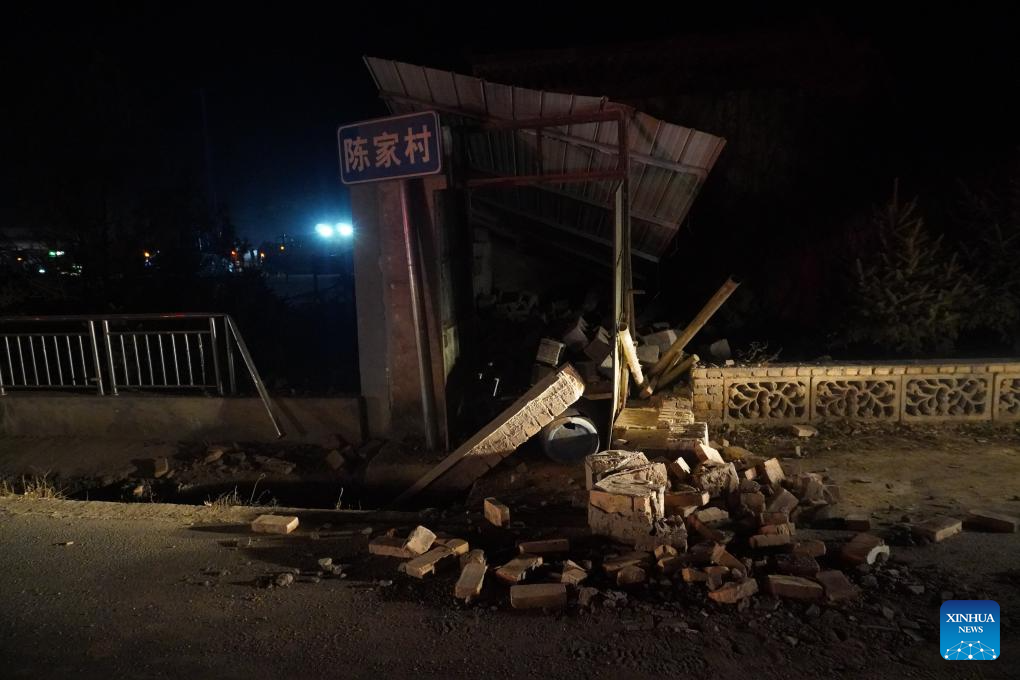

A Y-20 strategic transport plane of the People's Liberation Army has transported 14 tons of rescue supplies, vehicles and rescuers to the earthquake-hit area after a 6.2-magnitude earthquake occurred in Northwest China's Gansu province.
The plane took off from a military airport in Southwest China Tuesday morning and loaded the materials and personnel from an airport amid the mission and landed at the Zhongchuan Airport in Lanzhou city, Gansu province at 11:00 am.
Rescue teams are rushing to save people trapped in extremely cold weather by a magnitude-6.2 earthquake that jolted Jishishan county in Northwest China's Gansu province late Monday evening.
"Based on past rescue, the biggest difficulty of this operation is the local low temperature," Wang Duo, a team leader from the Gansu Houtian Disaster Rescue Center, was quoted as saying by China News Weekly.
The first group of rescuers arrived at the scene by 9 am Tuesday, with the second group close behind.
The temperature differential between day and night in northwestern China during winter is substantial. Currently, low temperatures are around -10 C, Wang said, adding that the trapped people are at great risk.
"The earthquake occurred in midnight, and many people did not have time to seek shelter," Wang said.
Rescue personnel are trying to speed up the rescue process. Wang said the typical golden rescue time for earthquakes is 72 hours, but it's shorter under the current weather conditions.
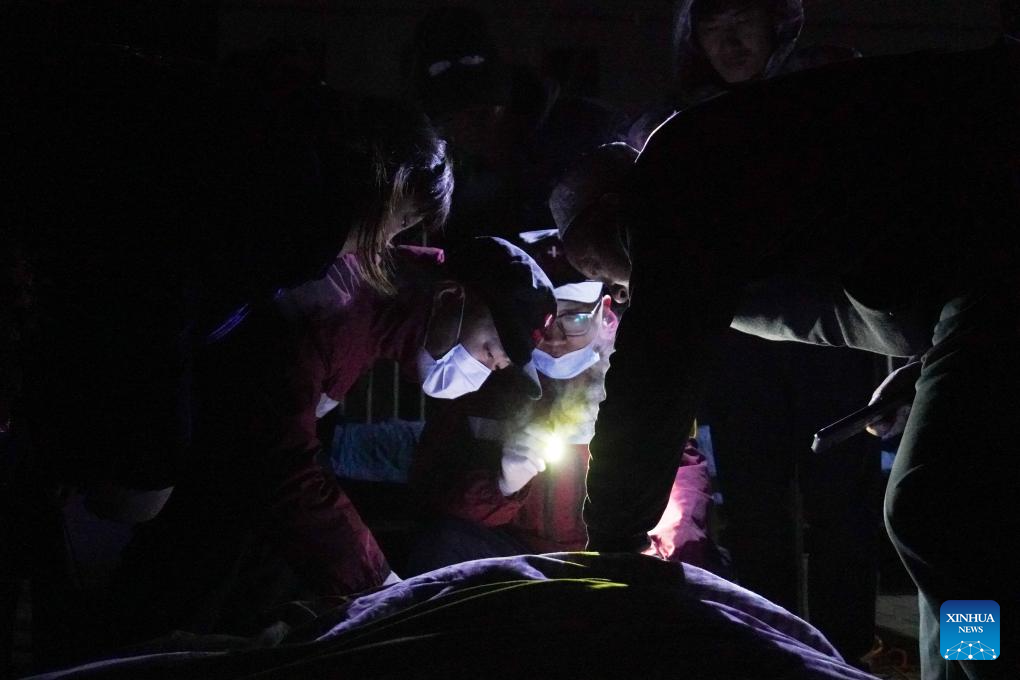
The National Development and Reform Commission has launched the emergency response mechanism and taken timely measures to ensure stable supply of energy, electricity and essential materials in response to a 6.2-magnitude earthquake that occurred in Northwest China's Gansu province.
The commission provided immediate guidance to power grid companies, urging them to expedite the repair of damaged power facilities. The commission also organized emergency power supply to address the critical electricity demands of the affected population.
Through the National Food and Strategic Reserves Administration, the commission promptly allocated relief materials, including cotton tents, quilts and cotton coats to the affected area, part of which has already arrived.
The commission will continue to coordinate with relevant departments and enterprises, monitor and track the situation on the front line, and provide comprehensive and continuous support to the affected region.
The earthquake jolted Jishishan county in Gansu province at 11:59 pm Monday with a depth of 10 km.
Li Menghan contributed to this story.
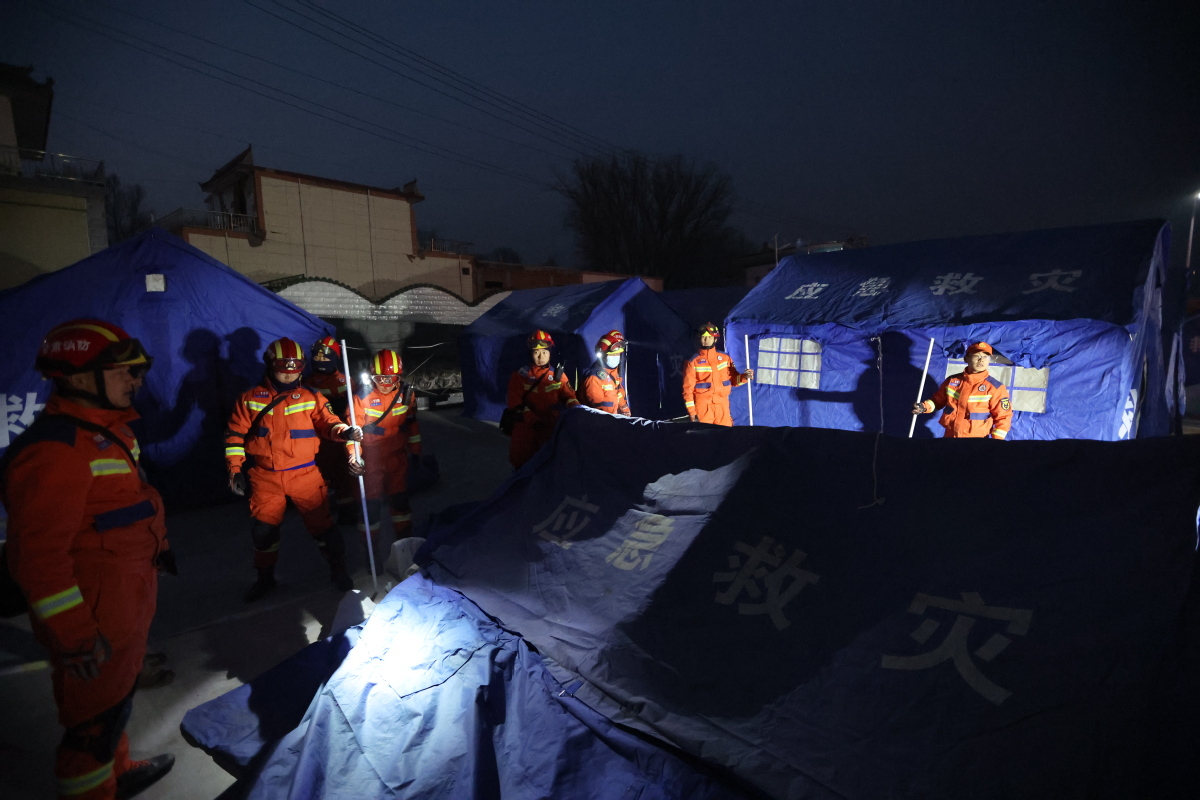
The ministries of emergency management and finance have allocated 200 million yuan ($28 million) to Gansu and Qinghai to help disaster relief operations in jolt-stricken areas in the two provinces, according to a media release from the Ministry of Emergency Management.
The release said 150 million yuan will be provided to Gansu and the other 50 million yuan to Qinghai.
The fund will be used to safeguard the safety of people's lives and property as well as minimize the losses and damages caused by the tremor, it noted.
A 6.2-magnitude earthquake jolted the two provinces on Monday shortly before midnight. Its epicenter is located in Gansu's Jishishan county, which neighbors Donghai city in Qinghai.
The jolt had a focal depth of 12 kilometers. The average altitude of areas within five kilometers from its epicenter stands at 2,793 meters, according to the Ministry of Emergency Management.
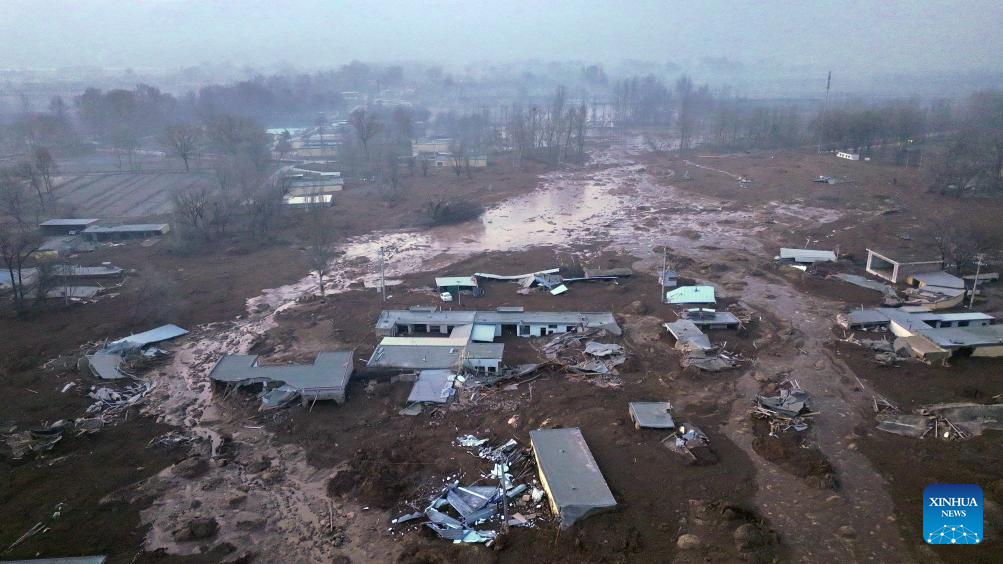
The Red Cross Society of China launched the second-highest emergency response of its four-tier system, allocating urgently needed relief goods and dispatching emergency working groups to quake-hit areas in Northwest China's Gansu province.
The RCSC also activated the emergency rescue and cooperation mechanism in the northwest region, dispatching rescue teams to the front line, including search and rescue, medical, and relief teams.
An initial emergency fund of 5 million yuan ($700,396) was provided, along with 700 tents, 2,000 folding beds, 12,700 quilts, 4,500 coats and 1,000 family packs.
The Gansu provincial Red Cross Society also allocated 200 tents, 2,000 quilts and 2,000 coats to support the rescue and relief work in the region hit by the quake.
The first batch of relief materials arrived at the affected areas at 9 am on Tuesday, and rescue teams have already reached the area and carried out rescue work.
The deadly 6.2-magnitude earthquake jolted the Jishishan county in Gansu province at 23:59 pm on Monday.
The epicenter was monitored at 35.70 degrees north latitude and 102.79 degrees east longitude with a depth of 10 km.
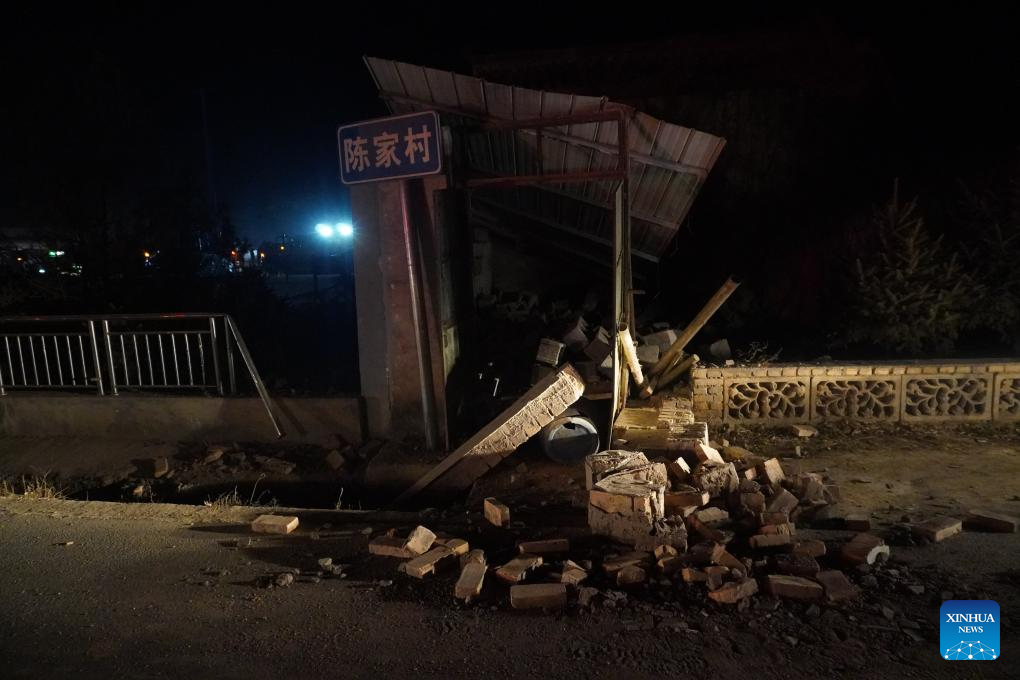
BEIJING -- China's top economic planner said Tuesday that it has activated an emergency response to ensure the supply of energy, electricity and daily necessities after a 6.2-magnitude earthquake jolted Gansu province.
The commission is actively guiding power grid enterprises to repair damaged power facilities, organize emergency power supply, and make all-out efforts to safeguard people's livelihood and ensure key electricity demand, Li Chao, spokesperson with the National Development and Reform Commission, told a press conference.
Disaster relief supplies, including tents, quilts and overcoats, have been allocated to the province, Li said, adding that the commission will continue to coordinate with relevant departments and enterprises to facilitate the relief work.
The 6.2-magnitude earthquake that jolted an ethnic county in Northwest China's Gansu province at midnight Monday has killed 105 people in the province, according to local authorities.

BEIJING -- The Chinese People's Liberation Army (PLA) and the People's Armed Police Force (PAPF) have deployed multiple rescue forces to quake-hit areas in response to a 6.2-magnitude earthquake that jolted Northwest China's Gansu province late Monday.
According to the PLA Western Theater Command, at 4: 00 am on Tuesday, around 300 troops from the command arrived in the hard-hit Jishishan county, Gansu. They were tasked with missions that involved searching for victims, rescue operations, and roadway clearing.
The PAPF Gansu Corps has mobilized over 300 officers and soldiers and deployed more than 40 vehicles to Jishishan. Their assigned tasks included searching for and rescuing individuals, facilitating the transfer of the injured, clearing obstructed roadways, and establishing tents as shelters.
The command added that a team of officers and soldiers of the PAPF Qinghai Corps had arrived in Minhe county, a severely affected area in Gansu's neighboring province of Qinghai. Additional rescue personnel are currently mobilizing for deployment.
Comprehensive analysis showed that there is a possibility of strong aftershocks with a magnitude of 5.0 in the near future in the epicenter area of the 6.2-magnitude earthquake in Jishishan county in Gansu province, according to a news conference on Tuesday morning.
According to the China Earthquake Networks Center, the quake jolted at 11:59 pm on Monday and had a focal depth of 10 km. The epicenter Liugou township is about 8 km from the county seat of Jishishan in Linxia Hui autonomous prefecture, Gansu.
The analysis was based on the characteristics of the seismic zone, historical seismic activity and the type of earthquake sequence in the region, a local official said at the conference.
As of 8 am, 32 aftershocks have been recorded, with the largest registering a magnitude of 4.0, said Han Shujun, a spokesperson for the provincial emergency management department, at the press conference.
As of 7:50 am on Tuesday, the quake has killed 105 people in the province.
It was also strongly felt in the neighboring Qinghai province, causing 13 deaths, according to earlier reports.

The National Health Commission, China's top health authority, said on Tuesday morning that it has dispatched its officials in charge of health emergency work and medical experts to Jishishan county in Northwest China's Gansu province after a 6.2-magnitude earthquake affected the area on Monday evening.
The death toll of the disaster has risen to 105 in Gansu province and 11 in the neighboring Qinghai province, Xinhua News Agency reported on Tuesday morning.
The commission said that it has sent national-level experts in the fields of intensive care, orthopedics, neurosurgery and general surgery from Peking Union Medical College Hospital in Beijing and West China Hospital of Sichuan University in Chengdu, Sichuan province, along with its officials responsible for medical emergency to Gansu province.
In addition, three national-level medical emergency aid teams in the provinces of Sichuan, Shaanxi and the Ningxia Hui autonomous region have been gathered to rush to Gansu and Qinghai to provide medical aid.
After the quake, the provincial health authorities of Gansu immediately sent 33 ambulances and other rescue vehicles as well as 173 medics to give treatment and transfer patients.
The Qinghai province has mobilized 68 ambulances and over 40 medical experts to give medical aid on-site.
As of 6:30 am on Tuesday, more than 300 injured people had been treated, said the commission.
The commission added that its expert panels are working with local health workers to treat injured people and devise personalized treatment plans.
More medics will be sent based on demands, it added.

Three cities and prefectures in Qinghai province were affected by the 6.2-magnitude earthquake in neighboring Gansu province, with the closest village to the epicenter only 12 kilometers away, local authorities said.
The earthquake was strongly felt in six districts or counties in Haidong city of Qinghai. The provincial capital Xining city and Gonghe county of Hainan prefecture also reported feeling the earthquake, according to Wang Haigong, deputy director of Qinghai Earthquake Agency, at a news conference on 3:50 am on Tuesday.
Nine aftershocks with a magnitude of 3.0 or higher were recorded as of 2:30 am on Tuesday — seven earthquakes in the range of 3.0 to 3.9 magnitude and two from 4.0 to 4.9 magnitude, he said.
The epicenter is 5 kilometers away from the provincial border of Qinghai. The nearest village is Daowei village in Xunhua county, which is about 12 km away. A total of 22 villages and towns were in the 50-km radius of the epicenter, according to Wang.
The earthquake bureau in Haidong city, which was hit the most in the province, sent staff to the affected areas to assess the situation. An emergency meeting was held to analyze the earthquake.
Eleven people have died and 140 have been injured in Haidong as of 6 am on Tuesday, China Central Television reported.
Qinghai activated a level-IV disaster relief emergency response on 2:10 am, asking all efforts to be made in searching for trapped people, personnel rescue, hazard investigation and assistance to affected people.
More than 800 personnel and over 70 vehicles from the emergency response, transportation, power, communication, health and other departments have been mobilized. Additionally, 30 provincial-level emergency rescue teams are on standby 24 hours a day, Qinghai Daily reported.

Gansu province's earthquake relief headquarters has started its Level II earthquake emergency response after a 6.2-magnitude earthquake jolted Jishishan county in the province late on Monday evening, according to a news conference on the quake held on Tuesday.
Before the conference started, the officials and reporters that participated in the conference observed a moment of silence to mourn the people who lost their lives during the quake.
According to the conference, the quake has killed 105 people and injured 186 others in the province as of 7:50 am on Tuesday.
Other people, with the exception of rescue teams, are advised not to come to the county and nearby areas that have been affected by the quake, ensuring that the traffic is smooth for rescue personnel, according to the conference.
The State Council's earthquake relief headquarters and the Ministry of Emergency Management have upgraded the national earthquake emergency response to Level II.

JISHISHAN -- The 6.2-magnitude earthquake that jolted an ethnic county in Northwest China's Gansu province at midnight Monday has killed 105 people in the province, according to a local press conference held on Tuesday morning.
According to the China Earthquake Networks Center, the quake jolted at 11:59 pm Monday and has a focal depth of 10 km. The epicenter Liugou township is about 8 km from the county seat of Jishishan Bao'an, Dongxiang, Salar autonomous county in Linxia Hui autonomous prefecture, Gansu.
The earthquake has also left 199 injured and damaged 6,381 houses in Jishishan. As of 8 am, 32 aftershocks were recorded, with the largest registering a magnitude of 4.0, said Han Shujun, a spokesperson for the provincial emergency management department, at the press conference.
The quake has destroyed some rural roads and led to power outages and telecommunication failures in some areas. The maintenance crew has been working overnight to repair the damaged infrastructure.
The earthquake was also strongly felt in the neighboring Qinghai province, causing 11 deaths, according to earlier reports.
About 70 percent of the families who had power failures after being hit by a 6.2-magnitude earthquake in Jishishan county in Gansu province on Monday at midnight have regained electricity supply as of 6:20 am on Tuesday, according to State Grid Gansu Electric Power Co.
The company said that, after the earthquake, two 35-kilovolt lines, 13 10-kilovolt lines and two 35-kilovolt substations experienced faults, affecting 34,070 households. As of Tuesday morning, power had been restored to 24,469 households.
According to the Ministry of Transport in a report of China Central Television, as of 6 am on Tuesday, the impact of the earthquake on railway infrastructure and operations is still being investigated.
The earthquake did not have an impact on civil aviation and postal operations, it said.
There are cracks on National Highway G310 where emergency vehicles and small vehicles can pass normally, but large vehicles are prohibited, it reported.
Houses and infrastructure such as water, electricity and roads in the epicenter and surrounding areas have been damaged to varying degrees.
To support the disaster relief work in Linxia Hui autonomous prefecture where the county is located, the provincial finance department allocated 20 million yuan ($2.8 million) as earthquake disaster funds on Tuesday in the early morning of Tuesday, local authorities said.





Eleven people have died and 140 are injured in Haidong city of Qinghai province as of 6 am on Tuesday, after a 6.2-magnitude earthquake hit Jishishan in neighboring Gansu province on Monday midnight, China Central Television reported.
Some houses have collapsed in Minhe, Xunhua, Hualong, and other counties and districts. Local power lines and communication networks are being repaired. Personnel rescue and disaster assessment work are ongoing, it reported.
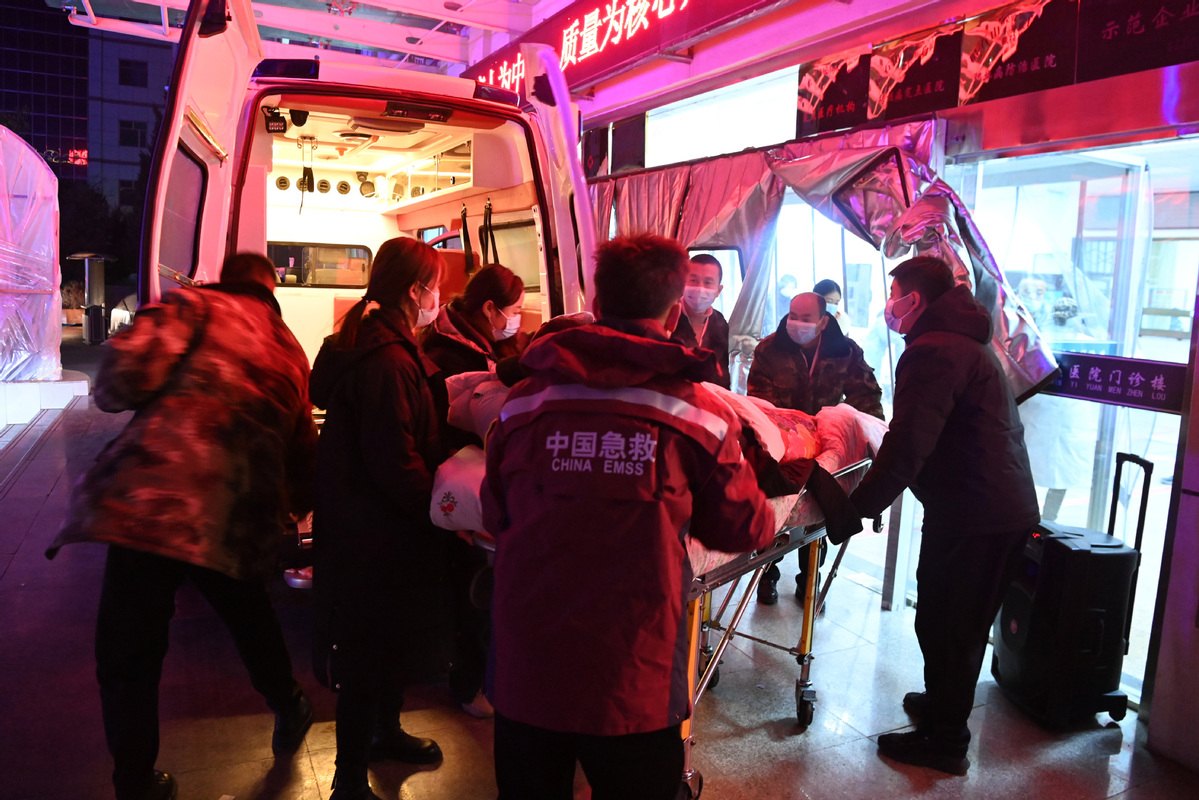
BEIJING - President Xi Jinping has urged all-out search and rescue efforts and proper arrangements for affected people to ensure the safety of people's lives and property after a 6.2-magnitude earthquake jolted Jishishan county in Northwest China's Gansu province at midnight Monday.
So far, the earthquake has caused 100 deaths in Gansu province and 11 deaths in Qinghai province, and damaged some infrastructure such as water, electricity, transportation and communications.
Xi, also general secretary of the Communist Party of China Central Committee and chairman of the Central Military Commission, asked local authorities to rescue and treat the injured people in a timely manner to minimize casualties, and closely monitor the earthquake situation and weather changes to prevent secondary disasters.
He also urged allocation of relief supplies to the affected regions as soon as possible, repair of damaged infrastructure such as electricity, communications, transportation and heating, and proper accommodation of the affected people to ensure their basic living needs.
The State Council is requested to send a working group to the disaster-stricken areas to guide the earthquake relief work. The Chinese People's Liberation Army and the People's Armed Police Force should actively cooperate with local governments to carry out emergency rescue and disaster relief, and do their utmost to ensure the safety of people's lives and property.
Premier Li Qiang also made instructions, urging all-out efforts to rescue the trapped and treat the injured in order to minimize casualties.
The State Council has sent a working group to the stricken regions to help guide relief work. Gansu and Qinghai provinces have organized relief support with immediate allocation of relief supplies such as camps and folding beds to the affected areas.
Earthquake relief work is undergoing in an orderly manner.
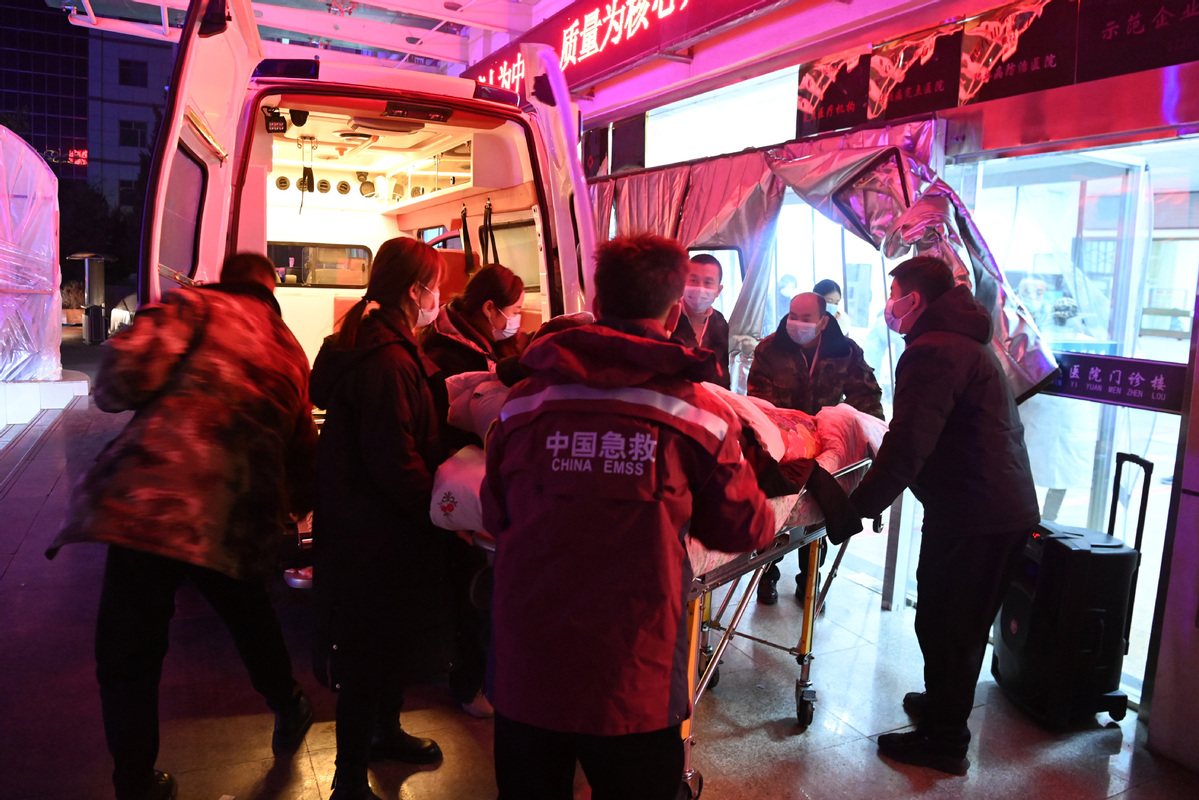
Latest: The 6.2-magnitude earthquake with a depth of 10 kilometers occurring in Jishishan county in Gansu province has caused 100 deaths in Gansu and 11 deaths in Qinghai as of Tuesday morning.
Additionally, some basic infrastructure such as water, electricity, transportation and communication have been damaged, according to Xinhua news agency.

A deadly 6.2-magnitude earthquake has claimed at least 86 lives, injuring 96 in Gansu province in northwestern China as of Tuesday morning and full-scale rescue work already underway.
The earthquake occurred in Jishishan County in Gansu province late on Monday. Due to the severity of the disaster, the State Council's command center for earthquake emergency response and the Ministry of Emergency Management have raised the national earthquake emergency response to Level II. The National Committee for Disaster Reduction and the Ministry of Emergency Management have also raised the national emergency response for disaster relief to Level III.
After the earthquake, a total of 1,440 firefighters from the national comprehensive firefighting and rescue teams were dispatched to the disaster area for rescue operations.
Additionally, 1,603 firefighters from Gansu province and neighboring provinces have been assembled and are on standby, ready to provide cross-regional reinforcements at any time.
BEIJING -- China's national commission for disaster prevention, reduction and relief and Ministry of Emergency Management have activated a level-IV disaster relief emergency response after a 6.2-magnitude earthquake jolted Jishishan county in northwest China's Gansu Province at midnight Monday.
A work team has been dispatched to the affected areas to assess the impact of the disaster and provide guidance for local relief operations.
In collaboration with the National Food and Strategic Reserves Administration, the two departments have allocated disaster relief supplies to the province. The supplies include cotton tents, overcoats, quilts and foldable beds.
LANZHOU -- Eight people have been confirmed dead after a 6.2-magnitude earthquake jolted Jishishan county in northwest China's Gansu province late Monday evening, according to local authorities.
The rescue work is underway.
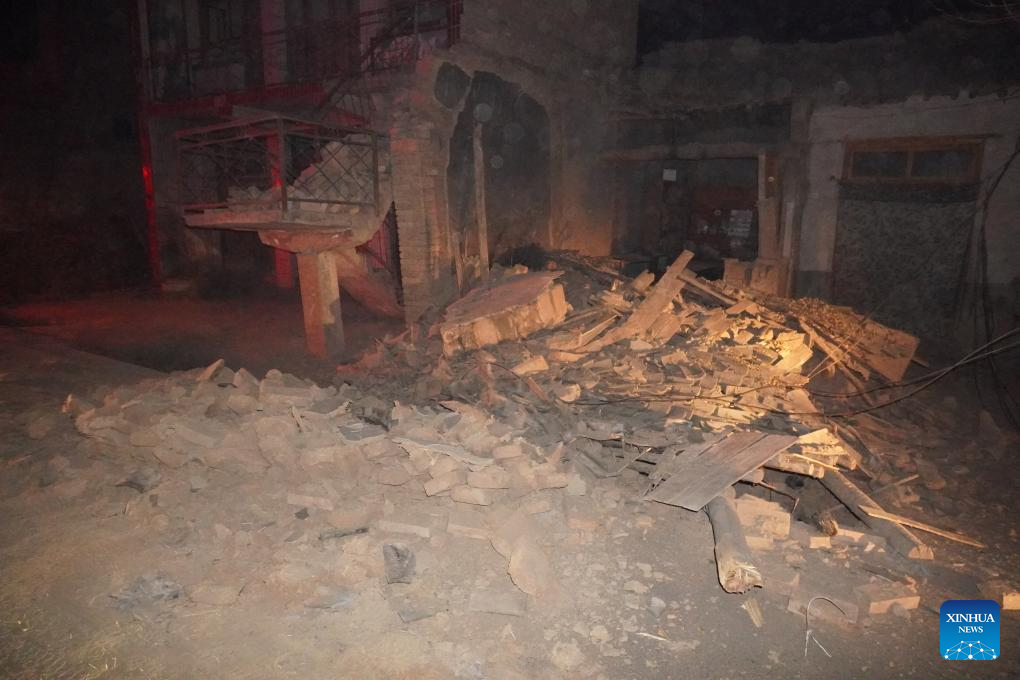
LANZHOU -- Some houses have collapsed after a 6.2-magnitude earthquake jolted Jishishan county in Northwest China's Gansu province late Monday evening, but casualties are still being investigated, according to the provincial emergency management department.
Heads of the provincial Party committee and government are rushing to the quake-hit area.
Local health authorities said they are ready to provide emergency medical treatment.
An emergency response has been launched by the local emergency management and fire departments.
Jishishan county is located at the junction of Gansu and Qinghai provinces, approximately 200 km from the provincial capital of Lanzhou. Many areas in Gansu and Qinghai experienced strong tremors.
In Jishishan and Yongjing counties, many people were seen on the street after the earthquake.
LANZHOU -- Local emergency management and fire departments launched an emergency response early Tuesday after a 6.2-magnitude earthquake jolted Jishishan county in Northwest China's Gansu province.
The county is located at the junction of Gansu and Qinghai provinces, approximately 200 km from the provincial capital of Lanzhou. Many areas in Gansu and Qinghai experienced strong tremors.
In Jishishan and Yongjing counties, many people were seen on the street after the earthquake.
The casualties and property losses caused by the earthquake are currently under investigation.
BEIJING -- A 6.2-magnitude earthquake jolted Jishishan county of Linxia Hui autonomous prefecture in Northwest China's Gansu province, at 11:59 pm Monday (Beijing Time), according to China Earthquake Networks Center (CENC).
The epicenter, with a depth of 10 km, was monitored at 35.7 degrees north latitude and 102.79 degrees east longitude, the CENC said.
